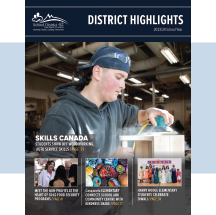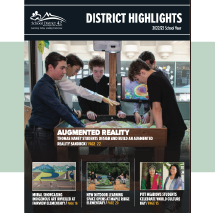Pictured above: Students from Mrs. White’s Grade 7 class at Pitt Meadows Elementary collect green bins from classrooms throughout the school each day and deposit the organic waste into larger bins that are collected by Ridge Meadows Recycling.
Mrs. White’s Grade 7 class at Pitt Meadows Elementary has discovered first-hand just how much organic waste is created daily at their school.
“It’s pretty surprising,” said student Faith Petti. Since October, each day after lunch, Petti and her classmates have volunteered to collect the organic kitchen catchers that were recently placed inside each of the school’s classrooms to allow K-7 students to separate food scraps and soiled paper so that it doesn’t end up in the regular garbage stream.
“I thought it was a great idea because it’s going to help the school and the environment,” said Petti.
“The kids have totally owned this program,” said teacher Nancy White.
White says her class has had discussions about landfills and ocean pollution and they understand that the world’s carbon footprint is increasing instead of decreasing.
“They know about the greenhouse effect. If we don’t make the change, we are not going to have a prosperous planet. They are concerned about their planet.”
White believes participating in a program like this will also help the students take on even bigger leadership roles in the future. “These kids are the leaders of tomorrow. I’ve got a fantastic group of kids.”
Pitt Meadows Elementary is one of five schools participating in a new pilot program created by School District No. 42. The pilot project is run by SD42 in partnership with each school’s recycling program that is led by staff and students – all of whom volunteer their time. The other participating schools are Pitt Meadows Secondary, Thomas Haney Secondary, Garibaldi Secondary and Glenwood Elementary. The organics are collected twice weekly by the Ridge Meadows Recycling Society and taken to Harvest Power where they are turned into soil.
****
Alexandra Tudose, SD42’s manager, energy and environmental sustainability, and John Hayer, SD42’s manager, custodial and community rentals have been tasked with rolling out the organics pilot program.
Tudose is especially excited that the program is a catalyst for “teachable moments” on topics such as climate change, bioenergy and composting. Prior to the launch of the program, Tudose and Ridge Meadows Recycling Society’s Daniel Mikolay spoke to students about organics and why diverting green waste from landfills matters.
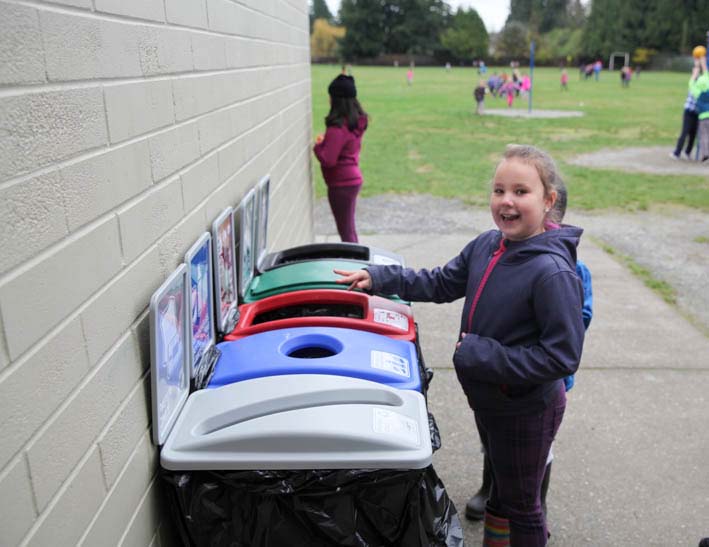
A new recycling station at Glenwood Elementary.
“I’m getting really positive feedback from students, about the program. They’re separating organics from garbage at home already, so doing the same thing at school just makes sense,” said Tudose.
In 2015, Metro Vancouver introduced a ban on organics in the regular garbage stream, noting that “food waste comprises about 40 percent of residential garbage, and almost a third of the food we buy ends up in the garbage.”
Hayer says that since the pilot project launched in October there’s already been a significant reduction in the amount of garbage pick-ups at the participating schools. “We have reduced the frequency of pickup and waste bin sizes for the various schools in the pilot project. The pilot program is not yet cost neutral and we are working on ways to reduce cost and make this pilot financially sustainable” he said.
The pilot is seeing results already by having diverted 3.18 tonnes of organics from the landfill during October and November.
Lessons learned from participating in the pilot organics program are equally important. “We want to teach our kids to look after the environment,” said Hayer. “We’re bringing environmental responsibility to the forefront with this program. I’m glad to see the kids stepping up to be environmental leaders and taking this challenge on.”
To ensure a successful roll out, the organics program follows a consistent engagement framework that is custom-tailored for each school and that takes buy-in from all staff and students in the schools.
****
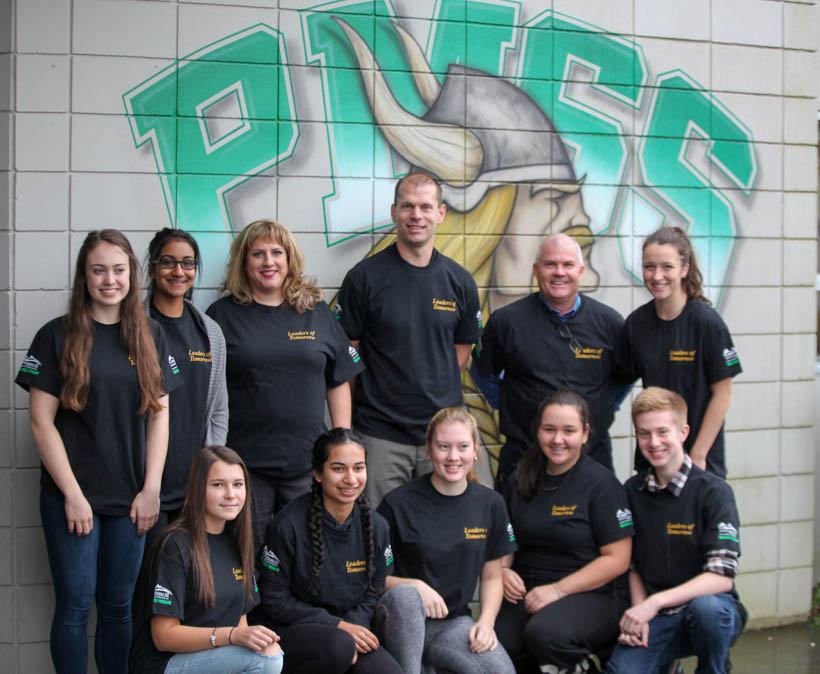
Pitt Meadows Secondary School’s Green Team.
Pitt Meadows Secondary counsellor Steve Kater says he’s noticed how diligent students have become when it comes to sorting through their recyclable waste at the stations set up around the school.
“They are taking the time to make the right choices,” he said. “We have less garbage containers in the school now. There’s a lot of school buy-in,” he said.
Grade 12 PMSS students Simone Mikolay and Mikayla Turnbrook have been a part of the PMSS Green Team since its inception and they are excited to make a positive contribution to the school and the environment. Through leading by example, they have enjoyed getting others to think about waste, recycling, and composting, and have also learned as a result of being involved in the program.
Students at Thomas Haney Secondary are also eagerly taking on the challenge of diverting organic waste from the regular garbage stream.
Jaden Dyer is a member of EcoAction, a group of student volunteers at THSS who manage the waste stations at her school.
“Having this program is great because now we are able to recycle organics,” she said. “It’s really amazing because all of us in the group are passionate about sustainable living.”
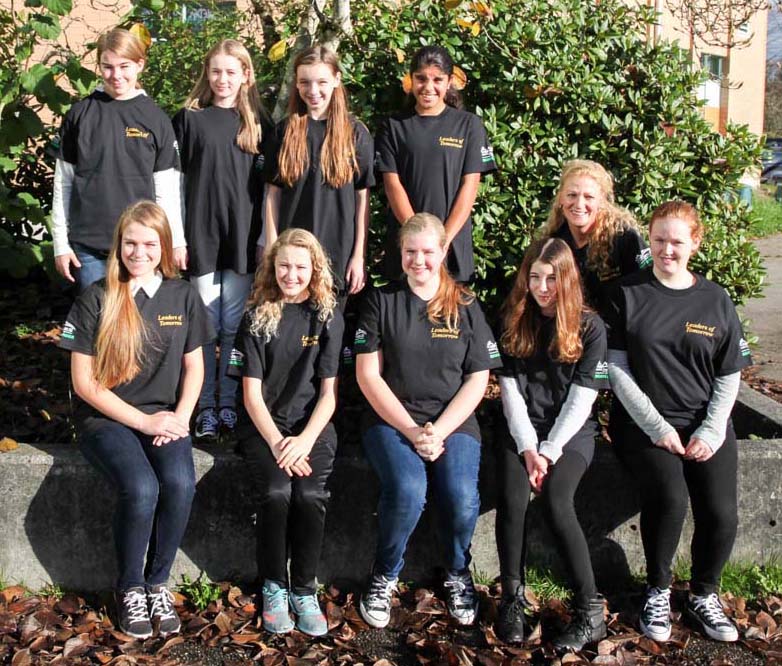
Thomas Haney’s EcoAction group.
She says the new recycling stations at the school make it easy for students to sort recyclables. “You can truly see how much of each product is being recycled and kept out of landfills,” she said.
SD42’s custodial services also plays a pivotal role in the new program by ensuring the organic waste is removed from sorting stations and bins and collected for recycling. “Expanding our recycling program by adding in organics throughout the school district can help positively impact the world. We all have a responsibility to take care of our environment for future generations,” said Ron Biss, head custodian at THSS.

